
It is easy to find and adopt a kitten. Kittens are cute and cuddly and lots of fun, but your kitten will grow into a cat in less than a year, and live for another ten years or more. Too many kittens are abandoned when they become cats, so before you decide to take a kitten home with you think about the responsibility of owning a cat, and be prepared to give them all they needs for the whole of their life.
A young kitten needs a lot of care and a lot of your time. They will need:
- many small feeds
- a safe comfortable place to sleep
- your company, and play, and training
- regular grooming
- veterinary attention
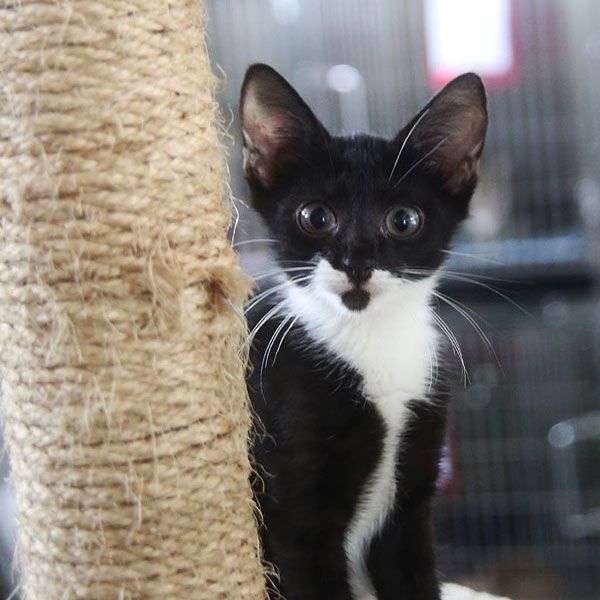
Choosing your kitten
To choose a healthy kitten, first look at the mother cat. If she is friendly, looks clean, well fed and healthy; then the kittens will probably be healthy too.
- your kitten should be at least eight weeks old and used to solid food
- they should be bright and alert and, when awake, playing with their litter mates
- they should be plump, but not pot bellied
- their coat and skin should be soft and clean, free from fleas, lice, mites and bare patches, and they should not be itchy or scratching
- their eyes should be bright and clear and should not be weepy
- they should be friendly and interested in you
If you want to adopt a kitten who does not look healthy, because they needs someone to care for them, first take them to the Vet Clinic for an examination to make sure that they can become healthy with good care and attention.
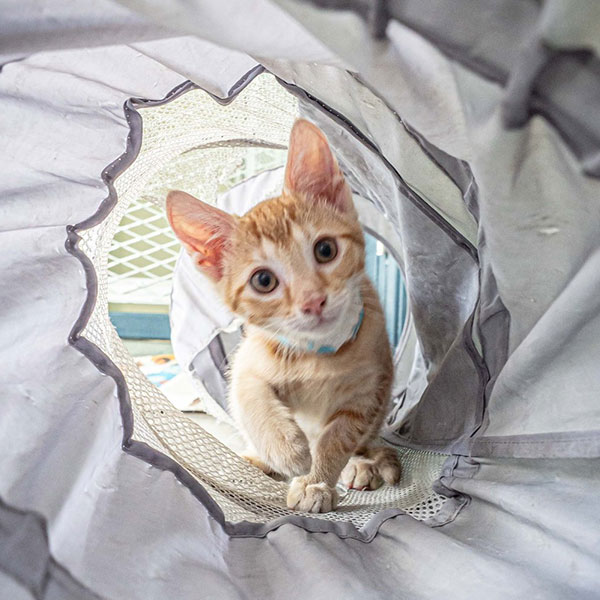
Taking your kitten home
Before taking your kitten home make sure that you have a litter tray, feed and bowls, and a soft and comfortable bed.
Is your cat going to be an inside cat? Many cats live happily indoors all their life, particularly when they live in a flat, or close to a busy road. In any case, unless you have a very secure yard, it is safest to keep your kitten inside for the first few weeks, so the first thing to do is show your kitten his litter tray, water bowl and bed.
A plastic litter tray can be bought, or a shallow box lined with plastic can be used. Sand, soil, shredded paper or commercial cat litter can be used in the tray.
It is important you provide your young kitten with a soft and cosy bed, a box or basket with an old towel inside will do, but they should be able to get in and out easily. At eight weeks of age your kitten will spend a lot of time sleeping.
When kittens are taken to a new home they will often find a quiet, dark corner and hide for a while. Wait for them to come out, then pet them. They will soon feel safe and start to play.
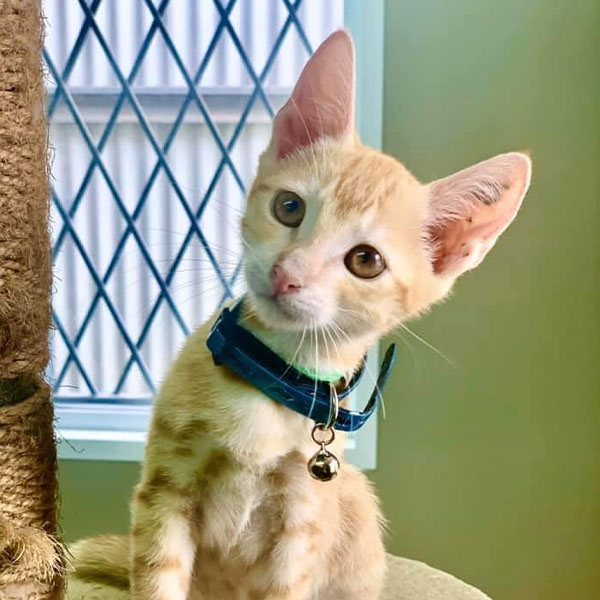
Feeding your kitten
Your kitten should always have a bowl of clean water. They will need to be fed four times a day for the first few weeks, until they are three months old, then they need three feeds a day until they are about 6 months old. Kittens need a diet that is mainly (two thirds) meat or fish (or eggs or cheese) with some cereal and vegetables. You can buy commercial cat or kitten food, or make your own, or use a mixture of homemade and commercial food.
Most kittens enjoy human food, and table scraps can be a PART of their diet. Cows milk can be a good source of food and calcium for kittens, but some kittens are unable to digest it. Give your kitten some milk, but if they have a stomach upset or a loose motion don’t give them any more.
Your kitten needs to chew on a raw bone, like a chicken wing, twice a week to help with teething and to keep their teeth and gums clean and healthy. Never give your kitten cooked‐bone, it splinters and can cause serious internal injury.
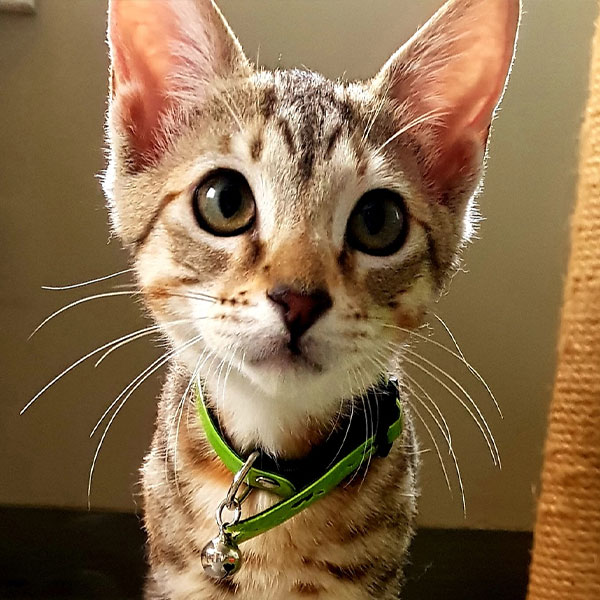
Training
Your kitten should be trained to use a litter tray, or go to the toilet outside, to come when they are called and the meaning of the word ‘no’.
If you want your kitten to go to the toilet outside, and you have a well fenced yard to prevent dogs from coming inside and your kitten from getting lost, pick a suitable place to be your kitten’s toilet area. Remember that cats prefer to use soil or sandy areas in a quiet spot. Carry your kitten to that place immediately after sleep and after eating, sit them on the ground and gently move their front feet in a scratching motion.
Teach your kitten to use a litter tray in the same way, because even if it is safe for your kitten to go outside, you may need to use a litter tray at any time if your cat needs to be kept indoors; for example if they are sick or move house. The tray should be placed where it is always accessible, but in a quiet place. While the type of litter used will dictate how often the tray should be cleaned, solid motions should be removed and flushed away as soon as possible. Clean the tray out frequently as cats will not use a dirty or smelly tray.
If your kitten uses the wrong place do not hit or scold him; take him to the right place, make the scratching movement with his paws and pet him. He should learn very quickly.
When training your kitten to come when they are called, and to stop what they are doing when you say no, reward them, with a small piece of food or a pet, whenever they obey you. Keep training sessions short, and make a game of them, but never hit them when they do something wrong, say ‘NO’ then find something they can play with.
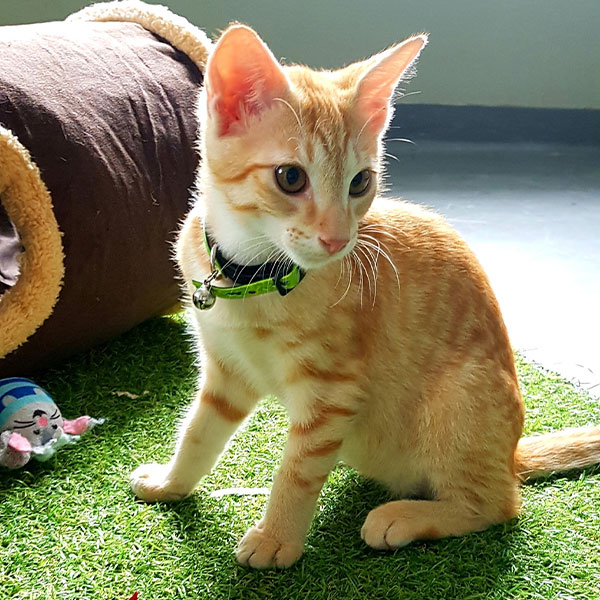
Grooming
Kittens are taught to groom themselves by their mother, and should lick themselves all over several times each day. You can help your kitten keep themselves clean by brushing them two or three times a week.
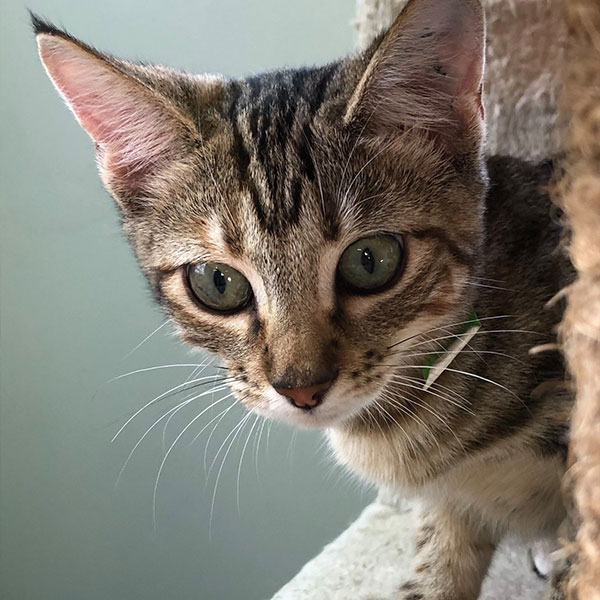
Veterinary attention
Kittens need to be vaccinated against feline enteritis and feline respiratory diseases. Vaccinations are usually given at 8 weeks and 14 weeks of age, and a booster vaccination is needed every year after that.
All kittens have intestinal parasites or ‘worms’. Dosing should be started at a very early age, so check to see what dosing the kitten has already received. Kittens 8 weeks old should be dosed every month until they are 6 months old, and then every three months.
Kittens also need to have all external parasites (fleas, mites and lice) controlled.
There are many products available for parasite control, and many have more than one use.
Discuss vaccinations and parasite control with the RSPCAPNG Vet Clinic; we want you to have a long and happy life together.
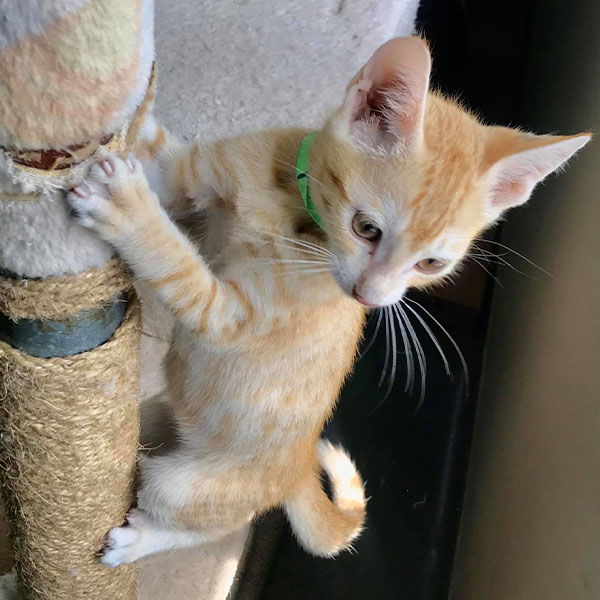
Going on holiday
If you and your family are going away from home at any time you must ask a responsible person to take care of your kitten every day that you are away and to seek medical attention for them if required. Alternatively the RSPCAPNG Vet Clinic has boarding facilities for any animal.
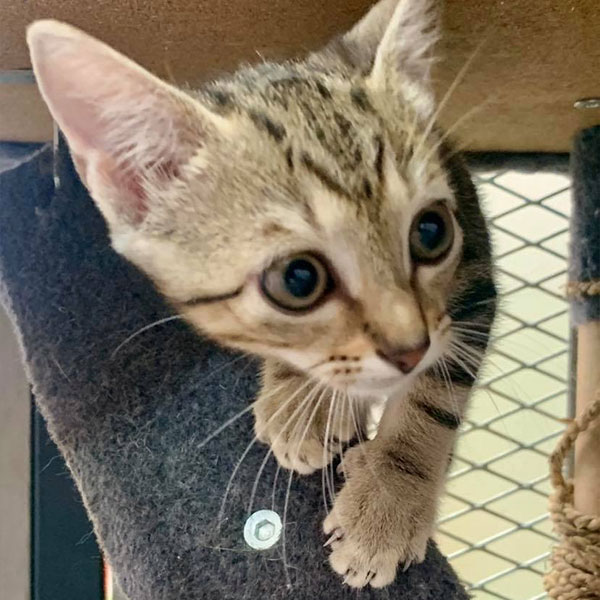
If you have any queries on the health or care of your pet please visit the RSPCAPNG Vet Clinic during surgery hours:
Monday – Friday: 9:00am – 4pm
Saturday: 9am – 1pm
Sundays and public holidays: Closed
The RSPCAPNG Shop stocks a full range of animal grooming and health care products and staff will be pleased to advise you on the best product for your pet.
The RSPCAPNG believes that all animals have the right to live their lives with:
- freedom from hunger or thirst
- freedom from excess heat or cold
- freedom from disease
- freedom from pain and suffering
- freedom to move and behave normally
For further details about membership or the work of the RSPCAPNG in Papua New Guinea please call 325 2363 or email rspca@rspca.colonygroup.co


